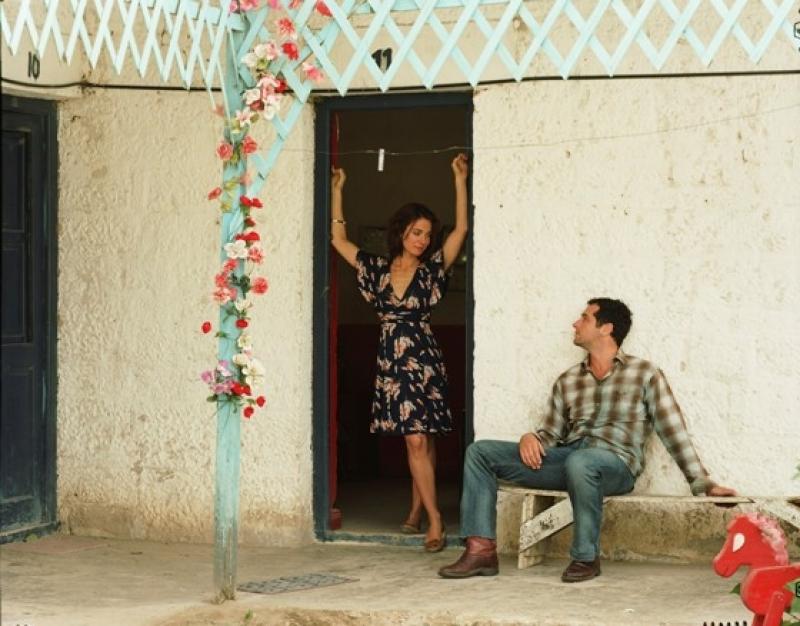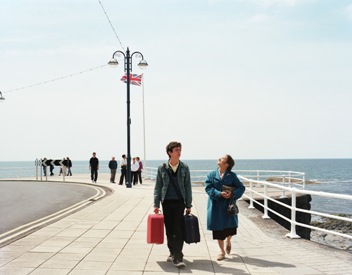Patagonia | reviews, news & interviews
Patagonia
Patagonia
A cinematic novelty in Welsh and Spanish is appropriate for all comers. It's got Duffy too

To anyone less than familiar with a transatlantic migration of 150 souls which took place in 1865, a bilingual film with dialogue in Spanish and Welsh may look like a subtitled bridge too far. Any such prejudgement would be a mistake. Patagonia is a film rich in cinematic textures which visits not one but two ravishing parts of the world rarely celebrated in widescreen.
Patagonia opens, appropriately, in the week of St David’s Day. March 1 found Hillary Clinton noting the enriching influence on the United States of its Welsh-Americans. You can only hope she wasn’t just referring to Catherine Zeta-Jones. But no Welsh-Americans have left their mark like the small band of settlers who first sailed to rural Argentina to escape the homogenising spread of the English language. It was a harsh initiation. “Croeso i Patagonia” says a card welcoming two visiting Welsh characters as they get off the bus in the middle of nowhere. The original settlers weren’t welcomed at all by a landscape offering neither water nor shelter. But they dug themselves in, other Welsh speakers followed from the old country and North America, with the result that in this lone outpost the language is still commonly spoken long after Welsh blood has mingled with other ethnicities.
To keep faith with their Nonconformist God, the settlers planted chapels in the pampas. It’s these that, in Patagonia, a Welsh photographer called Rhys (Matthew Gravelle) has crossed the Atlantic to record. His girlfriend Gwen (Nia Roberts) tags along, nursing a new desperate secret that, like the Patagonia first visited by settlers, she is barren. Hence she is unable to greet Rhys’s proposal of marriage in Buenos Aires with unadulterated joy. Her feelings are further complicated when, to drive them across the flat endless plains, Rhys hires a rugged Welsh-speaking caballero (Matthew Rhys) who soon enough is showing a more than friendly interest in Gwen.
 But curiosity cuts both ways in Marc Evans’s film, which is constructed as a diptych (Evans co-wrote the script with Laurence Coriat). While the Welsh tread in the footsteps of intrepid forebears, two Argentines are making their way towards Wales. One of them is Cerys, an elderly woman (Marta Lubos) who knows that she was conceived out of wedlock on a Welsh hill farm and that her mother was shipped out to Patagonia to spare her family the shame. Armed only with a name and an old sepia photograph, she spontaneously goes in search of her ancestral home in the Wales of her dreams, accompanied by a willing young neighbour called Alejandro (Nahuel Pérez Biscayart, pictured above with Lubos). Though diabetic and all but blind, she has a sixth sense that she’ll recognise it when she gets there.
But curiosity cuts both ways in Marc Evans’s film, which is constructed as a diptych (Evans co-wrote the script with Laurence Coriat). While the Welsh tread in the footsteps of intrepid forebears, two Argentines are making their way towards Wales. One of them is Cerys, an elderly woman (Marta Lubos) who knows that she was conceived out of wedlock on a Welsh hill farm and that her mother was shipped out to Patagonia to spare her family the shame. Armed only with a name and an old sepia photograph, she spontaneously goes in search of her ancestral home in the Wales of her dreams, accompanied by a willing young neighbour called Alejandro (Nahuel Pérez Biscayart, pictured above with Lubos). Though diabetic and all but blind, she has a sixth sense that she’ll recognise it when she gets there.
The moving reveals come quietly and undemonstratively, both in the script and the performances. Among the film's forgivable implausibilities, it’s maybe a bit of a stretch to believe in Matthew Rhys as a latinised gaucho but he rounds up a flock of sheep on horseback with native flair. Roberts and Biscayart both give hugely striking performances as slightly lost souls while, as Cerys, Lubos beautifully and wittily embodies that deep-seated Welsh spirit known as hiraeth – which pallidly translates as “longing” – despite speaking no more than a word or two of her mother’s language. Hats off too to Duffy (pictured below with Biscayart) who chuckles daintily as a young woman working at a Welsh campsite.
 While two tourist boards won't be complaining, this is much more than a travel brochure with a storyline. Evans deftly tweaks mood and tone as he cuts between paired narratives. While the two stories never meet, they cross-pollinate on other levels. Both visit St Fagans, the Welsh heritage museum. Music from each culture bleeds across from one landscape to the other, and the two languages go on an entertaining exchange trip too: Welsh is mostly spoken in the Patagonian scenes, Spanish in the Welsh ones.
While two tourist boards won't be complaining, this is much more than a travel brochure with a storyline. Evans deftly tweaks mood and tone as he cuts between paired narratives. While the two stories never meet, they cross-pollinate on other levels. Both visit St Fagans, the Welsh heritage museum. Music from each culture bleeds across from one landscape to the other, and the two languages go on an entertaining exchange trip too: Welsh is mostly spoken in the Patagonian scenes, Spanish in the Welsh ones.
If you squint hard at Patagonia in Patagonia, and pretend the grass isn’t yellow, some of its lumps and humps do look a bit like the steep green hills of home. On the deepest level of all, though, Evans’s affecting film asks what ties continue to link these two remarkably dissimilar places from opposite hemispheres, one baked by sun, the other washed by rain. There is no answer beyond memory, and the enchantment lent by distance.
Watch the trailer to Patagonia
Add comment
The future of Arts Journalism
You can stop theartsdesk.com closing!
We urgently need financing to survive. Our fundraising drive has thus far raised £49,000 but we need to reach £100,000 or we will be forced to close. Please contribute here: https://gofund.me/c3f6033d
And if you can forward this information to anyone who might assist, we’d be grateful.

Subscribe to theartsdesk.com
Thank you for continuing to read our work on theartsdesk.com. For unlimited access to every article in its entirety, including our archive of more than 15,000 pieces, we're asking for £5 per month or £40 per year. We feel it's a very good deal, and hope you do too.
To take a subscription now simply click here.
And if you're looking for that extra gift for a friend or family member, why not treat them to a theartsdesk.com gift subscription?
more Film
 Blu-ray: Finis Terrae
Bleak but compelling semi-documentary, filmed on location in Brittany
Blu-ray: Finis Terrae
Bleak but compelling semi-documentary, filmed on location in Brittany
 Oslo Stories Trilogy: Sex review - sexual identity slips, hurts and heals
A quietly visionary series concludes with two chimney sweeps' awkward sexual liberation
Oslo Stories Trilogy: Sex review - sexual identity slips, hurts and heals
A quietly visionary series concludes with two chimney sweeps' awkward sexual liberation
 Sorry, Baby review - the healing power of friendship in the aftermath of sexual assault
Eva Victor writes, directs and stars in their endearing debut feature
Sorry, Baby review - the healing power of friendship in the aftermath of sexual assault
Eva Victor writes, directs and stars in their endearing debut feature
 Blu-ray: Who Wants to Kill Jessie?
Fast-paced and visually inventive Czech comedy
Blu-ray: Who Wants to Kill Jessie?
Fast-paced and visually inventive Czech comedy
 Oslo Stories Trilogy: Love review - freed love
Gay cruising offers straight female lessons in a heady ode to urban connection
Oslo Stories Trilogy: Love review - freed love
Gay cruising offers straight female lessons in a heady ode to urban connection
 Beating Hearts review - kiss kiss, slam slam
Romance and clobberings in a so-so French melodrama
Beating Hearts review - kiss kiss, slam slam
Romance and clobberings in a so-so French melodrama
 Materialists review - a misfiring romcom or an undercooked satire?
Writer-director Celine Song's latest can't decide what kind of film it is
Materialists review - a misfiring romcom or an undercooked satire?
Writer-director Celine Song's latest can't decide what kind of film it is
 theartsdesk Q&A: actor Leonie Benesch on playing an overburdened nurse in the Swiss drama 'Late Shift'
The Guildhall-trained German star talks about the enormous pressures placed on nurses and her admiration for British films and TV
theartsdesk Q&A: actor Leonie Benesch on playing an overburdened nurse in the Swiss drama 'Late Shift'
The Guildhall-trained German star talks about the enormous pressures placed on nurses and her admiration for British films and TV
 Freakier Friday review - body-swapping gone ballistic
Lindsay Lohan and Jamie Lee Curtis's comedy sequel jumbles up more than their daughter-mother duo
Freakier Friday review - body-swapping gone ballistic
Lindsay Lohan and Jamie Lee Curtis's comedy sequel jumbles up more than their daughter-mother duo
 Eight Postcards from Utopia review - ads from the era when 1990s Romania embraced capitalism
Radu Jude's documentary is a mad montage of cheesy TV commercials
Eight Postcards from Utopia review - ads from the era when 1990s Romania embraced capitalism
Radu Jude's documentary is a mad montage of cheesy TV commercials
 The Kingdom review - coming of age as the body count rises
A teen belatedly bonds with her mysterious dad in an unflinching Corsican mob drama
The Kingdom review - coming of age as the body count rises
A teen belatedly bonds with her mysterious dad in an unflinching Corsican mob drama

Comments
...
...
...